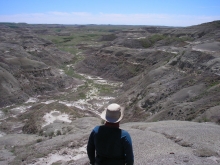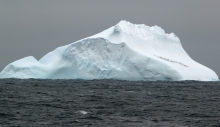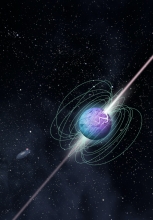Grants available for faculty at Canadian postsecondary institutions
Important: Please contact the International Engagement Unit - international.provost [at] mcgill.ca - to obtain the application form, budget sheet and privacy statement.
- Academic conferences and symposia
- Academic seminars and lectures
- Faculty of Agricultural and Environmental Sciences
- Faculty of Arts
- Faculty of Engineering
- Dental medicine and oral health sciences
- Faculty of Education
- International
- Faculty of Law
- Medicine and Health Sciences
- Faculty of Religious Studies
- Faculty of Science

The Faculty of Science is celebrating McGill’s 200th anniversary with a student art exhibition on the theme of “Science!”. McGill students at all levels and all faculties are invited to submit works in any medium, expressing what science means to them.
Faculty of Science bicentennial committee member, Torsten Bernhard, says the aim of the exhibition is to celebrate science in all its forms.
- Dept. of Anatomy and Cell Biology
- Art Exhibit
- Dept. of Atmospheric and Oceanic Sciences
- Dept. of Biochemistry
- Dept. of Biology
- Dept. of Chemistry
- School of Computer Science
- Dept. of Earth and Planetary Sciences (EPS)
- Dept. of Geography
- Dept. of Mathematics and Statistics
- Dept. of Microbiology and Immunology
- Dept. of Pharmacology and Therapeutics
- Dept. of Physics
- Dept. of Physiology
- Dept. of Psychology
- Redpath Museum
- Faculty of Science

To stop biodiversity loss, Canada recently committed to protecting 30% of its land and sea by 2030. But making conservation decisions about where to locate new protected areas is complicated. It depends on data both about biodiversity and about a range of benefits (e.g. freshwater, climate regulation, recreation) that people get from nature. Surprisingly, despite the size of the country, new mapping suggests that less than 1% of Canada’s land (0.6% of total area or approximately 56,000 km2) is a hotspot, providing all these benefits in one place.

The Living Library: Teaching Strategies from McGill Classrooms is a new initiative from the Office of Science Education to support faculty with planning and delivering courses.

It’s known that the primary cause of the mass extinction of dinosaurs, about 66 million years ago, was a meteorite impact. But the exact mechanisms that linked the meteorite impact to mass extinction remain unclear, though climactic changes are thought to have played a part.

Over the past 40,000 years, ice sheets thousands of kilometres apart have influenced one another through sea level changes, according to research published today in Nature. New modelling of ice sheet changes during the most recent glacial cycle by a McGill-led team offers a clearer idea of the mechanisms that drive change than had previously existed and explains newly available geological records.

Vertebrate populations - from birds and fish to antelope - are not, in general, declining. Despite what has previously been thought and said.

By Meaghan Thurston (Office of Research and Innovation)
Five projects led by McGill University researchers are included among the 79 receiving a total of $28 million in research infrastructure support through the Canada Foundation for Innovation (CFI) Exceptional Opportunities Fund. The announcement was made today by the Honourable Navdeep Bains, Minister of Innovation, Science and Industry during a news conference this morning.

New data from a Canadian-led team of astronomers, including researchers from the McGill Space Institute and McGill University Department of Physics, strongly suggest that magnetars - a type of neutron star believed to have an extremely powerful magnetic field - could be the source of some fast radio bursts (FRBs). Though much research has been done to explain the mysterious phenomenon, their source has thus far remained elusive and the subject of some debate.

Psychology researchers at McGill University have used network science – a mathematical technique for revealing connections and patterns – to gain novel insights into Montrealers’ experience of using French and English.
The unique approach has brought to light subtle differences as to which social settings Montreal bilinguals discuss certain topics and whether they use French, English or both languages to discuss those topics.

Four McGill researchers are among the sixteen eminent Canadian scientists, scholars and researchers that have been recognized by the Royal Society of Canada
Read their stories in The McGill Reporter:
Alfonso Mucci
Willet G. Miller Medal / Médaille Willet G. Miller
McGill Reporter story

Researchers from McGill University have revealed the steps by which two very distinct organisms – bacteria and carpenter ants – have come to depend on one another for survival to become a single complex life form. The study, published today in Nature, shows that the two species have collaborated to radically alter the development of the ant embryo to allow this integration to happen. Understanding how such grand unifications originate and evolve is a major puzzle for biologists.

How do people coordinate their actions with the sounds they hear? This basic ability, which allows people to cross the street safely while hearing oncoming traffic, dance to new music or perform team events such as rowing, has puzzled cognitive neuroscientists for years. A new study led by researchers at McGill University is shining a light on how auditory perception and motor processes work together.

Starting an undergraduate program is a big transition, accompanied by many uncertainties. The ongoing COVID-19 pandemic has added to the number of unknowns facing incoming students, through the switch from on-campus to online courses.
Recently, the Office of Science Education (OSE) and Teaching and Learning Services (TLS) hosted two panels to support U0 and U1 students admitted to the Faculties of Science and Engineering, as they prepare for their first year at McGill.
